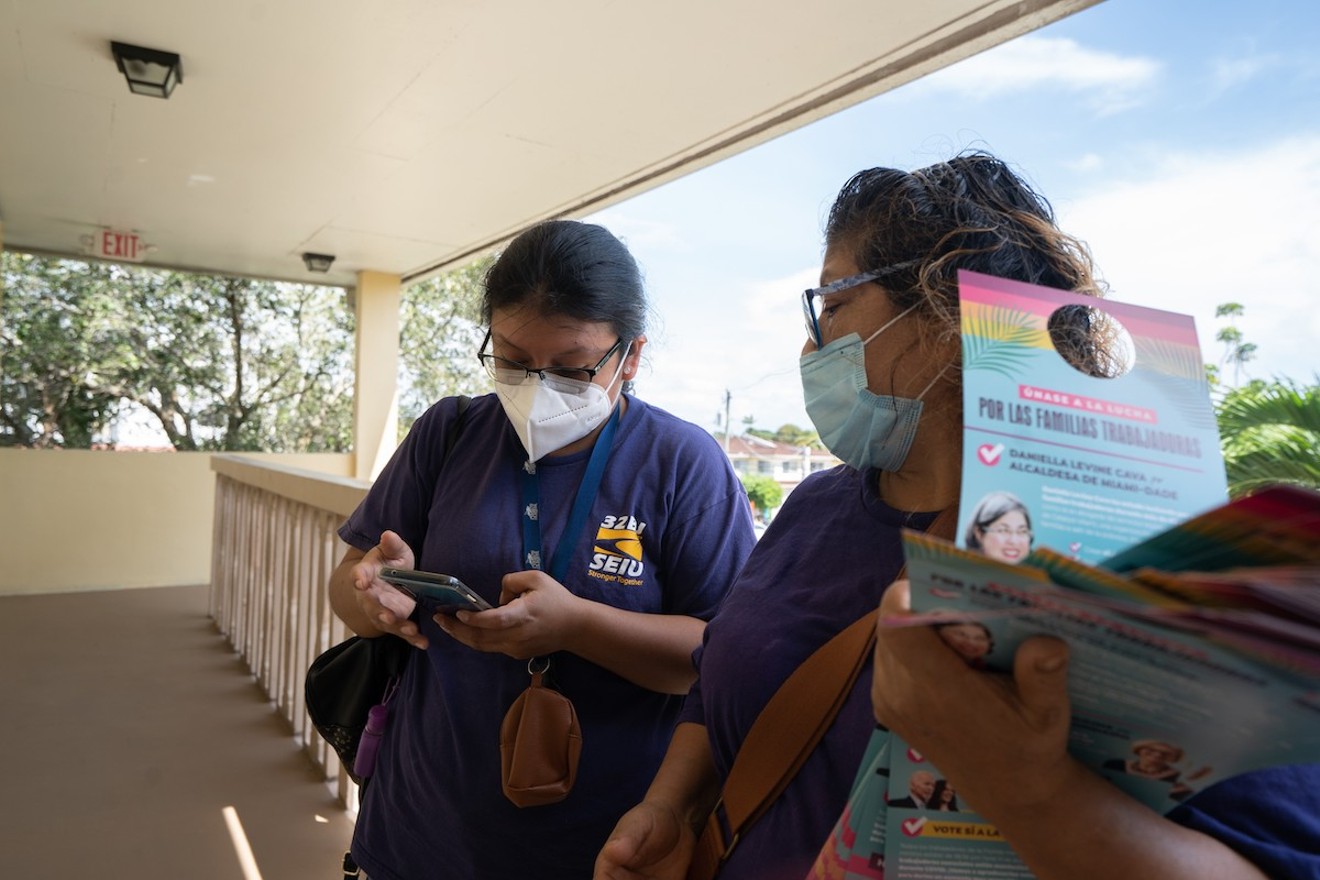On Election Day, members of 32BJ SEIU, the union that represents some service workers in Miami-Dade and Broward counties, went out for one final push to talk to voters about the Florida constitutional amendment that would increase the state's minimum wage.
Throughout the blustery afternoon, they knocked on doors in Westchester and visited small businesses in a shopping center that includes a locally owned gym, a nail salon, Dominican and Argentinian restaurants, pharmacies, and a grocery store.
Helene O'Brien, the union's Florida director, saw residents in the working-class neighborhood visiting the shopping center to buy groceries and medication. She says when they have extra money, they might even visit the nail salon or order food from the restaurants.
"Working people spend money in their communities," O'Brien says. "When they have more money, they'll come to local businesses."
This week, groups like 32BJ SEIU and Fight for $15 are celebrating Floridians' support of Amendment 2, which will gradually increase the state's hourly minimum wage from $8.56 to $15 over the next six years. The amendment got 60.8 percent of the vote, making Florida the first state in the South and the eighth state in the U.S. to approve a $15 minimum wage.
In Miami, many of the workers who mop the floors and take out the trash, cook and serve fast food, and care for small children live with the reality of near-poverty-level wages and the hustle of second and third jobs to make ends meet.
A living wage calculator from the Massachusetts Institute of Technology shows that a childless adult needs to make $13.17 an hour to earn a living wage in Miami-Dade. A single parent with one kid must earn $27.31 an hour to survive here. And for a family of four with two kids and two working adults, each parent needs to make $17.06 per hour to earn a living wage.
Supporters of Amendment 2 say the increase gives workers fair pay for their hard work, a chance to save for unexpected expenses or time off, and the ability to put more money into the local economy. An economist with the nonpartisan Economic Policy Institute says that gradually increasing the minimum wage to $15 by 2024 would be good for businesses, employees, and the economy. Higher wages would also reduce reliance on food stamps and other forms of government financial assistance, supporters say.
"Amendment 2 is life-changing for millions of workers in a state like Florida, where there's such a tourism- and service-based economy that exploits workers," O'Brien asserts.
Hector Rivera, age 62, makes $9 an hour working as a janitor at the Miami Tower and takes side jobs doing home repairs and electrical work so he can pay for his family's rent, his car loan, insurance, and food. Some weeks, he works seven days and only takes Sunday evenings off.
"At $9 an hour, I have to make a superhuman effort to pay the bills," Rivera tells New Times. "I'm killing myself, forcing myself to make enough money."
He says Florida's wage increase will give him more financial security, help him pay off his credit-card debts, and spend more time with his family.
"We need higher wages to survive and live well," he says. "Not well, but better. Miami is a very expensive city."
Some Miami businesses owners have applauded the minimum-wage increase. In a press release, Diego Tosoni, co-owner of the vegan restaurant Love Life Cafe in Wynwood, said, "We know that happier employees are more productive. Raising the minimum wage will also increase consumer spending, and that will consequently affect our business in a positive way. It is a win-win for everyone."
But other businesses and organizations worry the amendment will only lead to steeper job losses, reduced hours, and business closures in an already battered economy.
"Amendment 2 is bad for Florida and even worse for Floridians," Mark Wilson, president and CEO of the Florida Chamber of Commerce, said in a statement. "In these difficult times, this costly amendment hurts the very local businesses trying to survive the COVID-19 pandemic."
The chamber has concerns that Amendment 2 will increase the cost of living, kill jobs, expand workplace automation, reduce some employees' benefits, and cause businesses to relocate to states where the cost of labor is cheaper.
Florida Gov. Ron DeSantis also spoke out against the minimum-wage increase.
"Now is not the time," DeSantis said Monday. "Ballot Amendment 2 would close small businesses, kill jobs and reduce wages."
Forbes reports that a minimum-wage increase will impact state and local government budgets. A Florida Office of Economic and Demographic Research financial impact statement estimates that annual wage costs will increase by $16 million in 2022 and about $540 million in 2027.
"The drastic jump in costs would come from state employers needing to nearly double the minimum wage from today's by 2026 if the amendment passes," Forbes reports.
O'Brien, the Florida director of 32BJ SEIU, says she has concerns about DeSantis challenging the minimum-wage amendment but hopes he won't.
"Floridians believe that hard work deserves fair pay," she says. "And we also believe in democracy. If 60-plus percent of voters voted for this, I think it would be risky for him to lead the fight against it knowing he's on the ballot in two years, especially given the unemployment debacle he has led. If he does that, he's inviting a very fun gubernatorial campaign. Go ahead — make our day."
With his minimum-wage job, North Miami resident Hitoti Poroi says he can only afford to pay for rent and food at the moment. Poroi, a 40-year-old fast-food worker, had his hours cut because of the COVID-19 pandemic. He fills in the financial gaps by mowing lawns and taking on odd jobs for friends and neighbors as often as he can.
Poroi, a Tahitian-American, has been organizing with Fight for $15 for five years and has participated in strikes in Miami-Dade and Broward. He says the minimum-wage increase will help him pay off his debts so he can build strong enough credit to buy a home and, maybe, a car.
Poroi says he'll never forget when his son asked him to buy an Apple laptop for school a few years ago. The $1,000 price tag was too much for him to take on.
"I felt so bad," Poroi says.
He hasn't seen his son, who is 18 and lives in Tahiti, in five years. The first thing he would do with a little more money, he says, would be to buy a plane ticket so his son can visit him in Miami.
[
{
"name": "Air - MediumRectangle - Inline Content - Mobile Display Size",
"component": "19274298",
"insertPoint": "2",
"requiredCountToDisplay": "2"
},{
"name": "Editor Picks",
"component": "17482312",
"insertPoint": "4",
"requiredCountToDisplay": "1"
},{
"name": "Inline Links",
"component": "18711090",
"insertPoint": "8th",
"startingPoint": 8,
"requiredCountToDisplay": "7",
"maxInsertions": 25
},{
"name": "Air - MediumRectangle - Combo - Inline Content",
"component": "17482310",
"insertPoint": "8th",
"startingPoint": 8,
"requiredCountToDisplay": "7",
"maxInsertions": 25
},{
"name": "Inline Links",
"component": "18711090",
"insertPoint": "8th",
"startingPoint": 12,
"requiredCountToDisplay": "11",
"maxInsertions": 25
},{
"name": "Air - Leaderboard Tower - Combo - Inline Content",
"component": "17482313",
"insertPoint": "8th",
"startingPoint": 12,
"requiredCountToDisplay": "11",
"maxInsertions": 25
}
]












